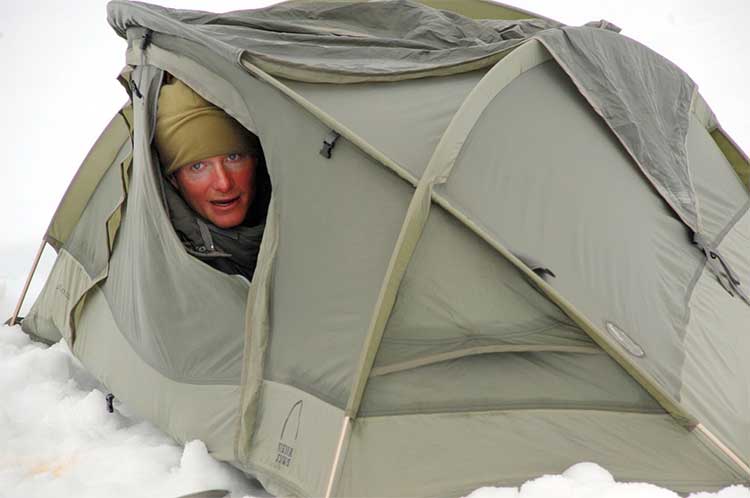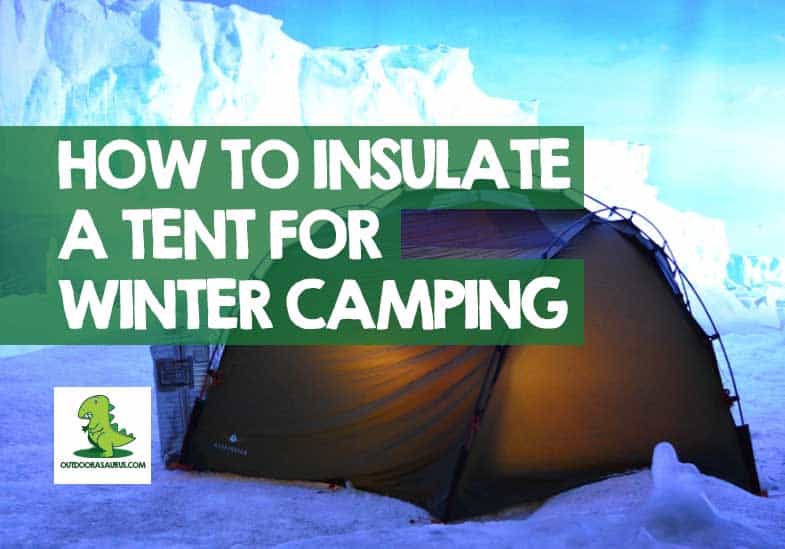During our last family camping trip, I spent some time with uncle. He’s ex-military and is always full of really interesting nuggets about survival techniques. It was really cold one night, so naturally the topic of conversation turned to how we could keep warmer at night. He explained how he used to insulate his tent during winter camping when in the army. I’ve decided to share those tips with you today.
How to insulate a tent in the winter
It goes without saying, but planning ahead for your winter trip is critical. You need to pick the right camping location, clothing, and supplies, and have a checklist on how to insulate the tent from the cold weather.
Here are those 9 tips from my uncle on how you can insulate you tent for winter camping.
1. Pick the right camping spot
Picking the right spot to pitch your tent during the winter months can have a significant impact on how well-insulated and warm you will feel.
To achieve this, you will need to start planning your trip early.
The key point here is to stay away from an open areas as they offer lesser protection against wind and snow. Since slow tends to flow down the slope, do not site your tent in low areas either.
The more protection you can get from the elements the better.

But you might have to compromise, as if you find the perfect area on rough terrain you will struggle to get the tent pitched.
If you’re going winter camping in an area which is frequented by tourists, look for online guides and advice as you might be able to get a clue as to the best tent spot.
2. Go for a smaller tent size
Smaller tents will keep the warmth in better, and will be far better insulated than a larger internal space.
The human body will generate heat during the winter months, and this will escape into the tent space. The smaller the space, the less cold air there is to mix in with the warm, and the warmth will have a smaller space in which to circulate.
It will be even better if you have another person in there with you, as two warm bodies are far better than one.
If the tent is large and there is a lot of space left unoccupied, you will have to work a lot harder to keep your tent properly insulated.
3. Use ground insulation
It is important you get enough sleep during winter camping. Your body is going to need as much rest as possible if the going gets tough.
To help you get a good night’s sleep and keep the cold out, I recommend sleeping on insulative materials like rugs, blankets or air mattress. An air mattress is the best option as it keeps your body off the ground, away from the cold earth.
Ground insulation will trap heat and stop the cold travelling up… so you won’t lose as much heat.
For optimal ground insulation, you can cover the floor with a rug before placing your air mattress on it.
4. Buy a tent heater or build a campfire
If your budget allows, you should consider buying a tent heater to install inside the tent. This will guarantee you will be warm throughout your stay in the tent. To avoid any complication, check your tent specifications before choosing a heater.
In case your budget does not stretch to purchase a tent heater, you can build a camp fire closer to the tent… but not too close for obvious reasons.
The recommended minimum distance between your tent and the campfire is two meters to avoid complications like fire hazard.
5. Build a thermal shield
Winter tent insulation isn’t just about what you do inside; you can also insulate the outside of the tent.
Cover the tent with an impermeable material like reflective foils or blanket. The reflective foil will reflect the heat generated within the tent back to you instead of allowing it to escape.
The blanket will also do the same thing. It would hold on to the heat and prevent it from escaping.
As double insulation, you can reinforce the tent cover with a waterproof tarp. The tarp will protect dew, frost, and ice from rendering the foil or blanket ineffective in insulating the tent.
You could also pack up some snow and place against the tent walls. It will offer the same function as the tarp.
The only caveat is that packing up too much snow against the wall can make the tent collapse and it is somehow difficult to know the right amount that will offer enough insulation without collapsing the tent.
Packing would be a last resort.
6. Always remove moisture from the tent
A wet cloth or moist sleeping bag will absorb the heat in the tent and thus decrease the overall heat. When you notice any wet or dampness in the tent, get rid of it immediately.
Plus, and this might sound counter-intuituve given tip 5, you should try to go out of the tent sometimes to get rid of snows that may have accumulated on the tent.
If you leave snow and ice to continually pile up, they can cause the tent to collapse.
7. Wear insulative materials
It is important you insulate yourself too during winter camping. Wear thermal clothing to stay warm inside and outside the tent.
Thermal clothes are elasticicated and made using special materials to make them comfortable to wear. It ensures the whole body is kept warm and dry including the feet.
If you can’t afford a thermal cloth, just go for normal weather clothing although they will be less effective in insulating you compare to thermal cloths. But you should be okay with your tent insulated in most winter months.
Make sure to go camping with enough clothes because you are likely to get wet often and you know such is not good for such weather condition ― you may need to change your clothes more often than you might think.
8. Eat and drink warm foods
This option is, of course, obvious but it is important to mention it as a reminder. Prepare some hot tea to drink and also eat your foods hot.
This will help to increase the heat from within although the major heat that will keep you warm will be naturally generated by your body from the metabolism of foods eaten.
Before going to sleep or when you wake in the morning, always take a walk. It sets the body in an active state to burn calories and as these calories are burned, heat will be generated to keep you warm.
Make sure to eat foods rich in calories during this time.
9. Don’t drink alchohol
Avoid drinking alcohol when winter camping. Whilst it might be tempting to have a “hot toddy” and you will feel warmer after a shot of whiskey, the reality is actually quite different.
Drinking alcohol increases the your blood flow and will lead to an increase in heat loss from your body.
Why you should insulate your tent during winter camping
You wouldn’t be reading this guide if you didn’t think tent insulation during winter camping was important. But why should you go the extra length of making sure you are warm?
The simple answer is that keeping warm during winter protects you from the dangers that extremely cold temperatures can induce.
Extreme cold has been linked to medical conditions like frostbite, hypothermia, heart attacks and pneumonia.
Common signs of hypothermia include;
- Drowsiness
- Loss of memory
- Weak pulse
- Slurred speech
- Shivering
- Lack of coordination
- Cold skin (in infants)
Common signs of frostbite include;
- Waxy or grayish skin
- Loss of feeling around toes and fingers
- Numbness
Conclusion
By preparing in advance for winter camping, you should be able to keep your tent insulated and warm. Make sure you pack all the items I’ve referenced in this guide, and you will dramatically reduce the chances of coming to harm.
And as a last note; always ensure to check the weather forecast before and after going for winter camping. It will help you to know what to expect and plan appropriately now that you know how to insulate a tent for winter camping.

